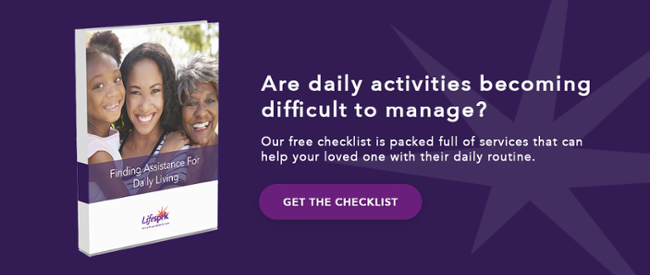
My mom used to always say: “Becoming a senior is not for sissies.” She was right, but being an adult caregiver for an aging parent is sometimes no piece of cake either. Providing senior care to an older loved one, whether at home or in an assisted living, is rarely a smooth path – it has its ups and downs, successes and frustrations. It can be as much an emotional roller coaster as it is a physical one.
Frustrations Can Pit Family vs. Senior
Mary Claire O’Brien, RN, a Life Care Manager with Lifesprk has seen first-hand how tensions can fester and create real family rifts. “There are often ongoing challenges, and if you don’t have the tools and resources to help, it can become a fractious process. Both the senior and the adult caregiver can begin to feel like victims of a system they don’t understand or that seems to be working against them. It can pit families against their loved ones and vice versa. The family may feel they are one step away from life being consumed by their loved one’s challenges. It creates feelings of isolation and tension. Each feels alone because they feel the other doesn’t understand.”
She stresses that “it’s important to be able to vent without guilt or ramifications, to share frustrations and have honest conversations. That takes some of the pressure off. These aren’t gripe sessions – they are just being straightforward about what people are encountering. It’s about listening to what people are facing and then working together on solutions that reflect their values.” We hear so often from older clients that they don’t want to be a burden to their families, and yet these unaddressed frustrations can create emotional stress that is just as exhausting as physical care.
So what can adult caregivers do to channel those frustrations? Here are 5 tips from Lifesprk’s Life Care Managers.
- Create An Open, Safe Forum for Communication
One of the main things Mary Claire does in her LCM role is to keep the lines of communication open for both the client and family to share their concerns and perspectives. But it all starts with building trust. “Our goal is to encourage open, candid, honest communication. We see it is often a gift for the client and/or the family to have someone – an objective professional such as their LCM – with whom they can share their frustrations, concerns, hopes, fears and that creates the biggest bridge to peace of mind,” she adds. “It gives them a safe opportunity to let off steam without fear of judgment. We know that the aging process can be confounding. Their loved one is changing before their eyes, and some challenging dynamics exist.”
As Kathy Christians, RN, Lifesprk Director of Life Integration explains, the older parent may not want to worry their children so they stop sharing information or concerns to keep from worrying them, but often the parent will share that information with a professional such as their LCM.
You may need a third party who can be objective, ideally someone with senior and/or home care knowledge, to help facilitate these conversations.
- Ensure You Understand Your Loved One’s Goals
Seniors want to be seen for whom they are – not their diagnosis, their condition, or their limitations. They want to live, not simply exist. The best path for relieving some of the tension with your parents is to see through your parents’ eyes.
“When a person comes out of the hospital, that person feels defined by lab results and diagnoses, medications, etc.,” stresses Kathy, “To me it’s so important to dig deeper to learn who that person is and what they want, how they view this stage of their life, and then try to figure out how they can achieve those goals. Of course, we continue to attend to health issues but we don’t lose sight of what’s most important to that person.”
Kathy recommends asking your loved one questions such as: their priorities, what activities and hobbies they enjoy, what a successful day will look like for them?
She adds that “at Lifesprk we’ve found that when we dig deeper into people’s goals and personal priorities, people become more engaged in the effort because they see it leading to goals they care about, which leads to better success,” and that can reduce tensions.
- Be Proactive
Start addressing little concerns before they become major issues. Identify the problem and all the options available, including the option to do nothing. Lifesprk LCMs have found through experience with thousands of clients and families that when you outline all the options proactively, it brings relief to everyone involved while affording more time to make decisions.
“When you’re proactive,” explains Julie Flanagan, RN, Lifesprk Campus Director of Life Care in Eden Prairie, Minnesota, “you’re better able to understand their desires, abilities, ideals, preferences, values and capabilities, and then easily relate and individualize services and support based off of what is realistic and attainable within a client’s lifestyle. For example, as an LCM begins working with a client in the early stages of dementia, we can monitor for changes or safety concerns, and when it is necessary to make changes in the level of care, we can help the client and family better understand their options to transition more gradually to added levels of support rather than have to make an extreme change.”
- Learn All Your Options
Mary Claire shared one client example where the senior didn’t have any specific diagnosis but all the symptoms were leading to a significant loss of functional status that made it difficult for the family to know what steps to take. Can they bring him home? Can they support him, what home care resources would they need, how much would it cost? “Sometimes just offering a discussion for problem-solving together and helping them anticipate what may lie ahead, identifying all the possible options can be a tremendous help to clients and families.”
Lifesprk Navigation offers a free service to seniors and their families to learn all their options. “We find so often,” adds Kathy, “that people have no idea that so many options exist. Or on the reverse, they may be so overwhelmed they have no idea what may be a best fit for them. That’s where we can help. Just call – our Navigators are specially trained, have dealt with thousands of different situations, and there’s no obligation to use Lifesprk services. In fact, we’re always connecting people to reliable resources beyond Lifesprk because we take a whole person senior care approach – not just a health or home care perspective.”
- Get Help – You Don’t Have to Do This Alone
The strongest suggestion from the Lifesprk Life Care Managers is for adult children to identify a trusted advisor. It may be your parent’s doctor or nurse practitioner, or perhaps it is an elder law attorney or a church leader. Lifesprk found this was often a missing piece from traditional home care options and so created the Life Care Management role for nurses to provide that guidance.
The key point is to make sure it is someone you and your parent can both trust. “Some of the best relationships have been forged when a family member truly opens up about their feelings, knowing it is with someone who shares the care (and caring) of their loved one. The deeper the relationship and the longer we know our clients and families,” says Mary Claire, “the more we are able to take some of the stress off them, and enable them to just be family. Getting people to talk openly and ask questions they may be reluctant to bring up on their own. As a professional in the situation, we can bring things up and take the onus off the family members to raise issues while also acknowledging how challenging these discussions and situations can be. There may not always be a simple answer but together we’ll identify all the options and what’s involved so people can make more informed decisions.”
She adds that “the one thing I really try to do is to keep communication going throughout. It’s not someone coming in to take over. I tell my clients and families that my role is to help broaden the safety net. We’re working as a team and I am a resource to keep the communication open. I can also help if they are seeking to let go of a few of the tasks, knowing they are still going to be apprised and have a say in the process, they just don’t have to do all the work themselves.
“By having Lifesprk involved, they know they are not going it alone. That is probably one of the biggest direct benefits as people face changes over time,” Mary Claire continues.
“The path for people through life is rarely a straight one,” she adds, “and by being involved as an LCM, I can help people anticipate those changes, feel in control, and help them stay on their path regardless of what they may face. We can’t eliminate every challenge, but I can help smooth the path and help them face each challenge confidently.”
What suggestions do you have for channeling those senior care frustrations? Share your successes and help others learn. Need help connecting to the resources for senior care or to learn your options? Take advantage of our free service. Call Lifesprk Navigation: 952-345-0919.
Channel On!



